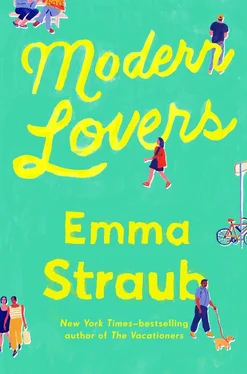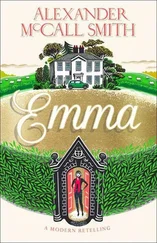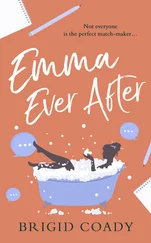He had his notebook with him. He’d been writing things down, not whole lyrics but ideas for songs. Elizabeth was much better at making things sound good. She had a notebook full of lyrics, too, or at least she used to. Now her notebook was filled with this couple or that’s likes and dislikes, their contingencies, the size of their bank accounts.
“Want to play that one from the other day, the bum-bum-bum- ting one?” Elizabeth asked. She settled into her chair and pulled her guitar onto her lap. She plugged it in and slid the strap over her shoulder. Andrew loved the way his wife looked with a pick between her teeth. It went straight to the very essence of him. Once, in high school, his history teacher had gone on an epic tangent about how Barbara Stanwyck was his “sexual profile,” and everyone got extremely creeped out, but that was how Andrew felt about women who played the guitar. It didn’t matter if they were really good or really bad or just holding one. If they could really play, forget it — he was done. It was deeply sexist, and so he’d never said it out loud (that was what Oberlin had been good for, teaching him that most things men thought on a daily basis were rooted in sexism), but it was true. With Elizabeth, it wasn’t just that she could play, but that she was really fucking good at it.
“What?” Elizabeth said, the pick still between her teeth.
“Nothing,” Andrew said. He grabbed his bass by the neck. “Sure, let’s play that one.”
“Actually, honey, I meant to tell you — the people called about Lydia again.” Elizabeth puckered her lips. “Can we talk about it? We’re supposed to let them know soon.”
A garbage truck clattered down the street, its brakes squealing every thirty feet. Andrew let go of his bass and ran his fingers back and forth through his hair. “I just don’t like the idea of signing a piece of paper that hands over the control to some giant corporation. Next it’ll be in a Kleenex commercial.”
“I’m pretty sure that we can stipulate exactly how they can use it,” Elizabeth said. “The movie is about Lydia, not about us. They don’t care about us, honey.” She leaned the smooth back of the guitar against her sternum.
“That’s exactly my problem,” Andrew said. “You didn’t write those words for Lydia to sing. We didn’t write that song to have teenage girls in the mall in New Jersey pretend to be punk.”
“You mean like teenage boys who grew up in Manhattan pretended to be punk?” She rolled her eyes. “Pot, kettle.”
“It was the eighties! I wasn’t pretending! I was fucking angry, and the fact that my parents were Reagan-loving demons had a lot to do with that. Come on, Lizzy.” Andrew crossed his arms over his chest and took a few deep breaths. “I just don’t want to contribute to some soft-focus portrait of Lydia Greenbaum as some kind of folk hero. Why should we help them?”
“Because they’ll give us money?”
“Are you really that cheap?”
Elizabeth felt the words as acutely as a slap. “Excuse me? Andrew, I understand that you and I feel differently about this, but the fact that I am willing to get paid a very healthy additional fee for work I did two decades ago does not make me cheap. Harry is going to go to college, you realize. Soon. This house needs twelve new windows. Our basement is a resort for cockroaches. We could use this money — the Marx family trust doesn’t have to pay for our lives, you know. I’m not being greedy.” She started to sweat. “And it’s not just about Lydia, you know, or us, even. It’s about being inspiring to young women, to girls who feel like maybe they could play music, too. Like that Girls Rock Camp or whatever.”
When they’d met, in Ohio, so far away from their families and from their real lives, there was no way to tell that Andrew had money and that she didn’t. Everyone was exactly the same. They all wore thrift-store clothes and carried bags from the army/navy supply shop. Elizabeth had always thought her parents’ house was normal — nice, even — until Andrew reluctantly brought her home for a visit during their senior year’s winter term.
They drove Elizabeth’s car — Andrew didn’t have a license, nor did he seem to have a sense of how to get around. He kept directing Elizabeth to go one way and then cursing when he realized he’d sent them in the wrong direction. They spent an extra hour driving in circles in New Jersey before finally finding the Lincoln Tunnel, then another hour crawling through traffic to the Upper East Side. Elizabeth drove with her shoulders hunched over the wheel, looking for a parking spot on the quiet, dark streets.
“This is where your parents live?” she’d asked, when he pointed out the building. It was on the corner of Seventy-ninth and Park Avenue, with a giant metal sculpture of a cat out front. They lugged their bags into the lobby, all marble and spotless black countertops. A doorman with a cap hurried to help them and greeted Andrew by name.
“Yeah,” he’d said, mortified. That night, when they curled up together on his childhood bed, in a room that overlooked Central Park, he’d told her how he fantasized about running away, about hopping on trains or sleeping on a bench in Tompkins Square. At Oberlin, Andrew majored in religion and was doing his senior thesis on Hindu goddesses. He wanted to move to Nepal. He wanted to sleep on the floor. He told Elizabeth over and over again how little his parents’ wealth mattered to him, and when she said that she was hungry, he called a diner on Lexington Avenue and had them send over scrambled eggs.
“I’m sure your parents have eggs in the kitchen,” she’d protested, but Andrew insisted that the diner’s were better. Elizabeth thought about those eggs on an annual basis, if not more often — still warm, and yes, delicious — and how they told her more than Andrew ever could about how he’d grown up. Sometimes even the brightest people had truly no idea.
“We don’t have to decide today,” Elizabeth said, shaking her head. “You play, I’m going to make lunch.” She put her guitar back on its stand, clicked the amplifier off, and walked out of the garage.
This time, Eliza and Thayer didn’t even pretend to say hello to Harry. They turned, saw him walk in with Ruby, and continued their conversation with no visible break. Rebecca, their fearless leader, was shuffling papers on her makeshift desk beneath the projection screen. Thick blue mats that the karate school used to teach people how to not get murdered by ninjas were still out, and a few kids in the class were doing somersaults.
“Oh, they are totally getting into Harvard,” Ruby said.
“I think that one looks more like a Yalie,” Harry said, pointing to one guy who had toppled over onto his side. “Maybe Princeton.”
“Barf,” Ruby said.
This was the only way that Ruby would talk about the future. She knew that Harry must be wondering why she was taking the class — no one took an SAT prep class for fun, especially not after their senior year — but Ruby never volunteered any information. She made fun of everyone who was going to good schools, but she also made fun of everyone who was going to big party schools and everyone who was going to tiny liberal-arts schools. It was open season on everyone but her. It wasn’t anyone’s business. So what if she’d applied to eight schools and not gotten into any of them? It didn’t make her a bad person, it made the admissions committees look like idiot snobs who deserved to be covered in honey and walked into the bear cage at the zoo. There wasn’t even really a point to going to college, not anymore, not for her. The thought of sitting through another four years of bullshit lectures about things that happened and books that were written hundreds of years ago was the world’s biggest waste of time and money. Ruby’s personal essay had been to that effect, and it appeared to have accomplished its goal. If either of her parents had thought to proofread her applications, they might not be in this pickle. She’d written the essay half as a joke, but then the joke had turned into her actual life. Ruby was sure that someone would stop her eventually. When she clicked the button to send in her applications, knowing what the attached documents looked like, Ruby kissed college good-bye. She wasn’t surprised when the applications were all rejected. At first, her mothers didn’t even know, because they were waiting for letters to show up in the mail, not realizing that nowadays letters only showed up if the news was good.
Читать дальше












